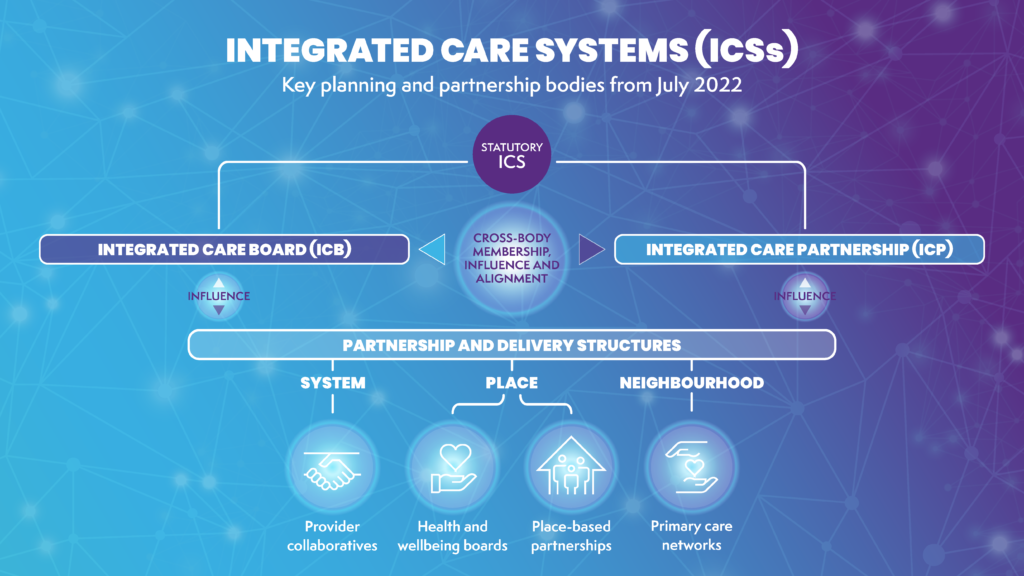What is an ICS?
Tags:
 Integrated care systems (ICSs) are groups of health organisations that work in partnership with each other, with the goal to improve the health of their population. They are central to the delivery of the NHS long term plan which aims to improve the outcomes of care.
Integrated care systems (ICSs) are groups of health organisations that work in partnership with each other, with the goal to improve the health of their population. They are central to the delivery of the NHS long term plan which aims to improve the outcomes of care.
Why now?
The introduction of ICSs comes recommended from NHS England and NHS Improvement. It is supported by years of locally led development and strategy that encourages joined up working to improve the health and care system in localised areas across England.
42 ICSs will begin to operate across England from 1st July 2022, with clear objectives based on the individual networks and groups that make up each integrated care system. You can find a list of all integrated care systems here.
The organisations within each ICS will have their own responsibility in meeting the delivery of high-quality care. However, the integrated groups will also be held accountable on the quality, safety, resourcefulness, and compliance against industry standards such as CQC.
Transparency, trust and mutual accountability is paramount amongst ICSs and will be key in the success of this new journey.
Radar Healthcare supports every part of ICSs
How will they work?

The integrated care systems will combine healthcare and social care networks and organisations that are geographically near each other. These feed into each other’s work to create a richer narrative on the state of health in that region. Each ICS will share a budget and a system, to ensure a more streamlined approach to public healthcare.
As well as NHS organisations, social care services will also contribute to the makeup of ICSs. Joining together both arms of the healthcare industry to improve the known health inequalities in England.
Each ICS will also be assigned an Integrated Care Board (ICB) and an Integrated Care Partnership (ICP) to keep each group on track. ICBs are replacing the functions previously provided by clinical commissioning groups (CCGs) and will oversee planning and strategy that was originally taken care of by NHS England. ICPs will operate as a statutory committee and work as a ‘middle ground’ for NHS bodies and local authorities to focus on health, public health and social care.
There will be a tiered system of partnership and delivery structures, starting from those covering higher populations to those covering smaller.
- Provider collaboratives (including NHS trusts and mental health) are at the System level which covers 1-2 million people.
- Health and wellbeing boards (including local authorities) are at Place level covering 250-500k people.
- Place-based partnerships also cover this population level and include local authorities, VCSE (voluntary, community and social enterprise) organisations and primary care.
- Neighbourhoods of 30-50k people are primary care networks, which include GP practices, dentistry, pharmacy and opticians.
The integration with social care
Critics of the ICS framework and some care experts are concerned that the two branches that make integrated care systems are not equal. Methodist Homes (MHA) report a 23% pay disparity between equivalent jobs within the NHS and social care – both in salaries as well as pensions and sick pay. People are calling for these inequalities to be rectified before the move, to create a better foundation for working.
Public Policy Projects recommends training for all ICS staff in the use of all systems to ensure equal knowledge across the group that will provide a fairer foundation to work on.
Furthermore, they suggest that a local-government style complaints handling process would help to assess issues in relation to the ICS as a whole. This is rather than individual parts – moving firmly away from the siloed nature of the previous framework.
How will technology help?
Having a digital system that can span across a large geographic area and over numerous services can cut time and save on resources like money and people. With ICSs, they are due to cross multiple towns and cities so having accurate information on patients, staff and sites will be vital to their success.
What should integrated care system software be capable of?
Radar Healthcare is experienced in helping large Trusts and national care organisations oversee operations in their many locations from one screen, with our all-in-one risk, quality, and compliance system.
Our Auditing module allows audits to be broken down by departments and roles, so you can be assured that staff members are allocated and complete their tasks on time.
An ICS could span hundreds of miles and so it is understandable that trends may skew differently for cities, towns, and villages. Radar Healthcare’s Analytics module is designed to home in on specified datasets to ensure you and your team are seeing the information and patterns that you really need to see. Armed with this information, you can make improvements for safer health and social care.











